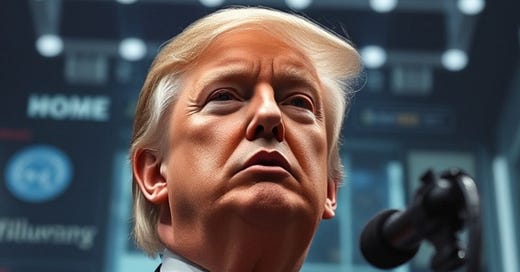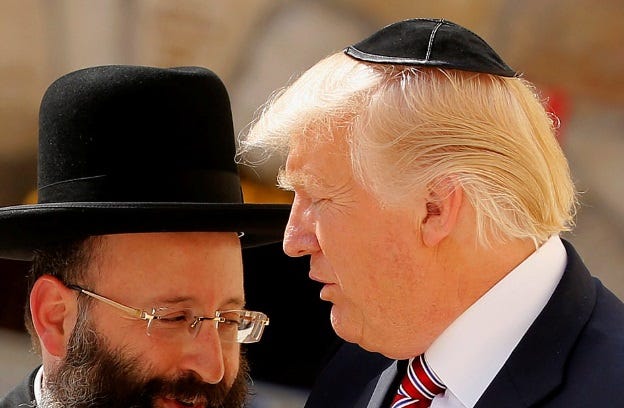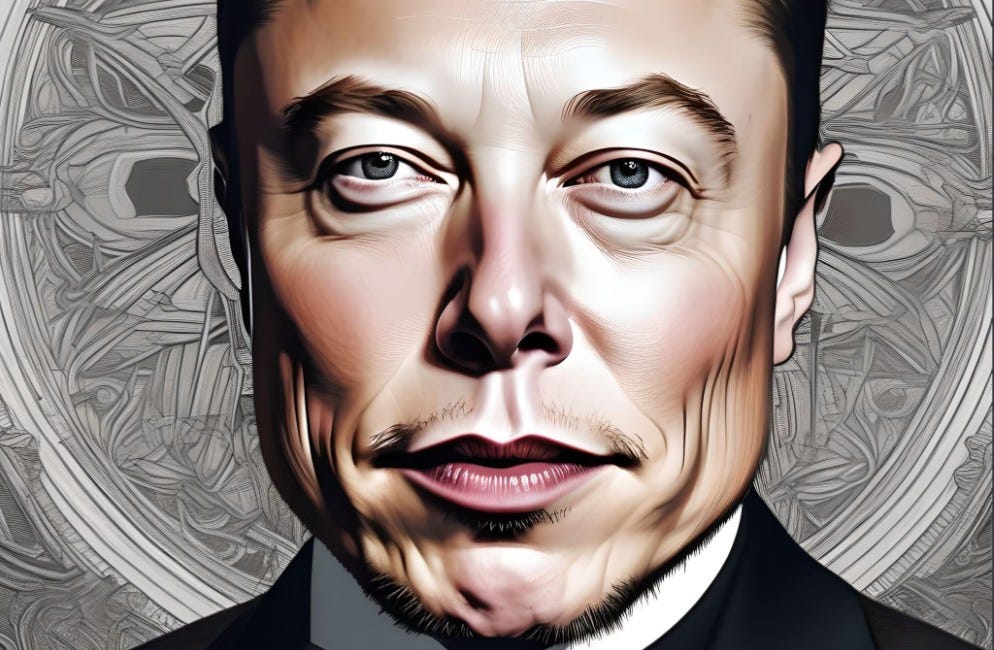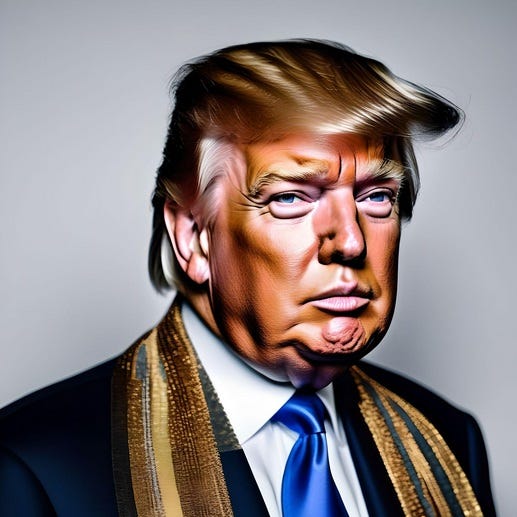Matthew 7:16-20 (KJV): "Ye shall know them by their fruits. Do men gather grapes of thorns, or figs of thistles? Even so every good tree bringeth forth good fruit; but a corrupt tree bringeth forth evil fruit. A good tree cannot bring forth evil fruit, neither can a corrupt tree bring forth good fruit. Every tree that bringeth not forth good fruit is hewn down, and cast into the fire. Wherefore by their fruits ye shall know them."
BLUF: The world is shifting toward a technocratic future, driven by AI, digital currencies, and mass surveillance. Catalysts like mass deportations, civil unrest, corruption, and AI-driven automation will accelerate this change, with figures like Elon Musk playing key roles. This push toward centralized control blends globalist agendas, including ties to Israel and spiritual elements, aiming to replace traditional governance with AI systems that monitor and control every aspect of life, eroding personal freedoms for efficiency and control.
Introduction:
This substack channel has repeatedly warned of the technocratic plans and agendas that promise to shape the world into a dystopian, authoritarian nightmare. These plans aren’t inevitable, yet we’re moving toward them with ever greater haste. What has been lacking in my bird’s eye view analysis is the how, the catalyst of change.
This article will fill in a few gaps, explaining some of the parallels between Javier Milei and Donald Trump and more specifically the changes made in Argentina that are a likely testing arena for planned changes in the United States and thereby much of the world. Furthermore, this article will refine the argument, honing in on the Department of Government Efficiency (DOGE) and its true aims to reshape America and beyond.
The Uncanny Parallels of Javier Milei and Donald Trump:
Javier Milei, elected president of Argentina December 2023, shares many similarities with Donald Trump. They’re both brash populist leaders with flamboyant hair and strong ties to Israel that have promised to slash government inefficiency, tackle corruption, drain their respective swamps, they were both covered heavily on social media and alternative platforms, with promises to fix the economy and move away from Central Bank Digital Currencies, undo environmental regulations, and both have made promises to make each country an important hub for AI.
Javier Milei:
Javier Milei's campaign centered on a radical reshaping of Argentina's economy and governance, advocating for libertarian and neoliberal policies. Key components of his platform included:
Deregulation: Milei called for the deregulation of various sectors, notably energy and labor markets, aiming to reduce government intervention and promote free-market policies. His goal was to create an environment more conducive to investment and private enterprise by removing what he viewed as burdensome regulations.
Climate Change Hoax: Milei was openly skeptical of the prevailing climate change narrative, dismissing it as a "hoax" and questioning the global consensus on the issue. He pledged to prioritize economic growth over environmental regulations, positioning himself against international climate accords and green policies.
Inflation and Central Bank Reform: Milei’s most prominent economic position was his desire to eliminate Argentina's Central Bank, which he blamed for rampant inflation. He proposed adopting the US dollar as the official currency (a policy known as "dollarization") to stabilize the economy and curb hyperinflation.
Downsizing the Government: Milei advocated for reducing the size of Argentina's government by cutting public spending, eliminating unnecessary state programs, and privatizing state-owned companies. His aim was to reduce the fiscal deficit and make the government more efficient.
Artificial Intelligence (AI): Milei has expressed strong support for the development and integration of AI technologies. His government proposed investing heavily in AI.
Anti-Corruption and "Draining the Swamp": Milei presented himself as an outsider committed to rooting out corruption. He promised to dismantle what he called the corrupt "swamp" of Argentina’s political elite, pledging transparency, accountability, and reduced government intervention in the economy.
Ties to Central Banks and Globalist Financial Institutions: Milei’s stance on central banking and global financial institutions is multifaceted, even though he ran on a platform opposing the Central Bank of Argentina and advocating for the dollarization of the economy. However, his policy actions and appointments suggest some alignment with international financial norms and figures connected to globalist circles:
Carlos Melconian: one of the key figures Milei brought on board was Carlos Melconian, a well-known economist who had served as an executive in the Argentine banking sector. Melconian's ties to the financial establishment are significant, and while he has been an advocate for neoliberal reforms, he also has deep connections to the global financial system. As the head of the National Bank under Milei, Melconian has been a bridge between Milei's anti-central bank rhetoric and the realities of working with the international financial system.
IMF and World Bank: Milei has expressed strong support for relations with international institutions such as the International Monetary Fund (IMF) and the World Bank. While he is critical of Argentina’s past dealings with these organizations—particularly the 2018 IMF loan—Milei’s economic agenda, which includes a commitment to fiscal austerity, aligns with the broader neoliberal approach of these institutions. Milei's promise to open up Argentina’s economy to global trade and investment, combined with his push for privatization, signals his willingness to engage with global financial entities to stabilize Argentina’s economy. This openness is at odds with his anti-globalist rhetoric during the campaign.
Dollarization and Financial Integration: One of Milei’s most significant economic proposals was to dollarize Argentina’s economy, effectively removing the Argentine peso and adopting the US dollar as the official currency. While he has framed this as a solution to hyperinflation and the country’s ongoing economic instability, it also ties Argentina more closely to the US Federal Reserve (a Central Bank) and the global financial system. Dollarization could limit Argentina's monetary policy autonomy, binding the country to global financial markets and the policies of the US central bank.
Environmental and Climate Change Agendas: Milei has been outspoken in his skepticism of mainstream climate change narratives, calling it a "hoax" and attacking international environmental agreements. However, his administration’s policies have reflected a more nuanced stance, especially with regard to global climate accords and environmental governance.
Climate Change Dismissal vs. Rejoining Paris Agreement: Milei has repeatedly called climate change a "scam" and rejected global environmental frameworks, asserting that they are used to impose restrictions on developing economies like Argentina. He has spoken out against Argentina’s participation in the Paris Climate Agreement, arguing that it imposes unfair burdens on Argentina's economic development. However, in a notable shift, Milei appointed Juan José Aranguren, a former CEO of Shell Argentina and former Minister of Energy, to advise on energy policy. Aranguren is a strong proponent of aligning Argentina with international climate accords, including the Paris Agreement. This contradiction raised eyebrows, as Milei’s hiring of Aranguren signaled a potential softening of his anti-climate change stance in favor of international engagement on environmental issues.
Green Energy and Fossil Fuels: While Milei has criticized the environmental movement, he has not completely turned his back on all forms of green energy. However, his approach is more pragmatic, focusing on increasing energy independence and cutting subsidies for renewable energy initiatives that he believes are inefficient. At the same time, Milei’s government has been supportive of expanding fossil fuel extraction in Argentina, particularly oil and natural gas reserves in Vaca Muerta, one of the largest shale deposits in the world. This aligns with a more traditional, economically conservative view, but it also ties Argentina to global energy markets where fossil fuels remain dominant.
International Investment in Argentina's Resources: Milei's desire to attract foreign investment and integrate Argentina into global energy markets ties the country’s economic future to multinational corporations and international policies on energy, which may include green energy regulations or commitments to carbon reduction targets. While his rhetoric attacks "green socialism," his policies seem to reconcile Argentina's energy needs with global expectations on sustainability, again contradicting his campaiugn rhetoric.
Technology and Surveillance - AI, Drones, and Predictive Policing: Another area where Milei’s government seems to intersect with globalist policies and international technologies is his embrace of Artificial Intelligence (AI), surveillance technologies, and predictive policing. While he has been an advocate for innovation and technological advancement, there are concerns that these technologies could reinforce state power in ways that align with global surveillance norms, especially considering the global debate on privacy and civil liberties.
AI and Surveillance: Milei’s government has aggressively pushed for AI technologies, including predictive policing and the use of AI-driven drones for surveillance across Argentina. These technologies are often associated with more authoritarian forms of governance, and the implementation of such systems ties Argentina into broader global trends towards surveillance capitalism and predictive technologies. The drones, for example, are part of a new national security strategy that uses AI to predict and prevent crimes before they happen, reflecting a form of governance that many critics associate with more centralized, top-down control.
“Pre-crime” and Security: Milei’s embrace of predictive AI, particularly for pre-crime systems, is a direct alignment with global trends in law enforcement and security. AI-driven "pre-crime" initiatives are already being employed in countries like China and the United States, where technology is used to monitor populations and predict criminal behavior. By deploying such systems, Milei’s government aligns itself with a global push toward surveillance and AI-powered crime prevention, a policy area often criticized by privacy advocates.
Global Tech Companies: The use of AI in Argentina also suggests a closer alignment with global tech companies and foreign investors who are pushing the boundaries of what constitutes personal privacy and state oversight. This includes international companies that are already leading the charge in the AI and drone industries, raising concerns about Argentina’s reliance on foreign technologies and the potential for foreign influence over national security policies.
Internationalization of Economic Policies: Milei’s pro-market policies and plans to liberalize Argentina's economy, privatize state-owned enterprises, and reduce import tariffs align Argentina more closely with global trade frameworks and international financial systems. His economic team, including individuals like Melconian, has emphasized the importance of trade agreements with the US, Europe, and other global powers, reflecting a shift toward economic policies that tie Argentina's future to global markets, despite Milei's anti-establishment rhetoric during his campaign.
Donald J. Trump:
Donald Trump needs less introduction than Javier Milei, as he was a famous actor before winning the US Presidential Office in 2016 and again in 2024. This section will simply highlight some of the similarities and parallels with Javier Milei.
In his 2016 presidential campaign, Donald Trump promised to rebuild America’s infrastructure, focusing on modernizing and revitalizing the country’s aging transportation networks, roads, bridges, airports, and power systems. His vision was to create jobs and stimulate economic growth through substantial public-private investments in infrastructure. While much of the rhetoric centered on traditional infrastructure, Trump's actions and policies indicated a deeper, more complex plan, with a strong emphasis on telecommunications, AI, and technological advancement—all of which have ties to his broader technocratic agenda.
Telecommunications and AI Infrastructure in Trump's 2016 Campaign and 2024 Focus: In his 2016 campaign, Trump’s infrastructure promises touched on issues that, while not explicitly linked to AI, laid the groundwork for technological advances that would support future AI-driven industries. These efforts have become more apparent in his 2024 campaign, which has notably centered on artificial intelligence and its potential to reshape the US economy and global competitiveness.
Broadband Expansion and 5G Rollout:
One of the key areas Trump focused on was expanding high-speed broadband internet, particularly to rural areas that were underserved. Trump’s push for greater broadband access was seen as part of his broader economic plan to modernize the US and ensure that its workforce was prepared for the future. This emphasis on telecommunications was especially important in supporting the growth of AI, smart technologies, and automated industries, all of which require fast, reliable internet for real-time data processing and global connectivity.
Trump’s deregulation efforts allowed for the mass rollout of 5G towers, which are essential for the development of AI and other advanced technologies. 5G is set to enable faster communication speeds, lower latency, and greater data capacity, all of which are necessary for AI-driven innovations, such as autonomous vehicles, smart cities, and IoT devices. By easing regulatory hurdles for telecom companies, Trump helped accelerate the infrastructure needed to power these technologies.
AI and Technocratic Vision:
In his 2024 campaign, Trump has increasingly focused on AI as a cornerstone of the US economy, with plans to promote AI innovation and ensure that the US remains the global leader in AI technologies. This commitment signals a shift toward a technocratic agenda, where technological advancements, including AI, automation, and data-driven governance, are central to policy. This aligns with the growing importance of AI in the global economy, and Trump's emphasis on telecommunications and data infrastructure fits into this vision, as these are the backbone of AI's growth.
As part of his 2024 push, Trump has also highlighted his support for AI research and the development of AI-powered industries. This includes investments in AI applications for areas like healthcare, energy, and transportation. His focus on advancing AI technologies also reflects a technocratic approach to governance, where data, technological solutions, and algorithm-driven decision-making become integral to managing the economy and society.
Surveillance, Data, and the Technocratic Agenda: Another significant aspect of Trump’s approach to infrastructure and technological progress was his emphasis on surveillance technologies and data collection, which are vital components of a technocratic agenda.
Surveillance Cameras and Data Collection:
Under Trump’s administration, the expansion of surveillance cameras across the United States became more prevalent, particularly in urban areas. This expansion is part of a broader trend toward data-driven security systems, which rely on vast networks of cameras, sensors, and AI-powered analytics to predict and monitor crime. These technologies, including predictive policing and real-time data analysis, rely on the kind of infrastructure Trump promoted in his earlier plans for high-speed data networks and smart grids.
Surveillance cameras, integrated with AI systems, are increasingly used for public safety, urban planning, and even pre-crime prediction. This aligns with Trump’s focus on modernizing infrastructure for data-driven decision-making, where the government collects and analyzes vast amounts of data to manage cities, economies, and national security.
Data Privacy and Technocracy:
While Trump’s policies focused on promoting technology and AI, they also raised concerns about privacy and government oversight. His administration's deregulation efforts, including the rollout of 5G and the expansion of surveillance systems, placed less emphasis on protecting citizens' data privacy. This shift toward increased data collection and surveillance is consistent with the technocratic vision, where data is viewed as a key resource for governance, security, and economic development.
The technocratic agenda suggests a future where algorithms and AI play a central role in governance, monitoring, and controlling various aspects of society. This vision emphasizes the importance of data infrastructure—telecommunications networks, surveillance systems, and AI-driven solutions—as essential components of the future state.
Trump’s Alliances and Technocratic Backing: Trump’s connections with prominent figures in the tech industry also hint at his growing affinity with a technocratic approach to governance:
Elon Musk and Technological Leadership:
In his 2024 campaign, Trump has cultivated relationships with figures like Elon Musk, who has become a symbol of the AI and technology-driven future. Musk's ventures—such as Tesla, SpaceX, and Neuralink—represent the kind of bold technological advancements that align with Trump’s push for AI-driven growth and economic modernization. Musk’s leadership in AI and autonomous vehicles makes him a crucial ally in Trump's vision for a tech-driven future.
Trump’s support for Musk’s companies, and his emphasis on AI innovation, signals a commitment to technocratic principles, where technology leaders are pivotal in shaping the future direction of the country.
Bill Gates and Backing of Technological Figures:
In 2016, Trump also received support from Bill Gates, the co-founder of Microsoft and a major figure in the tech industry. Gates has been a prominent advocate for the development of AI, smart grids, and technology in education and healthcare, aligning with Trump’s broader technological ambitions. While their political views often diverge, Gates’ backing of Trump during the 2016 campaign pointed to a shared recognition of the growing importance of technology and AI in the global economy.
Gates has since advocated for AI research and global collaboration in developing technological solutions to global challenges like healthcare, energy, and climate change—areas that are integral to Trump’s broader technocratic agenda.
Bill Gates: 'Trump is open-minded'
Bill Gates Meets With Donald Trump To Discuss ‘The Power Of Innovation’ | NBC News
DOGE and Incoming Technocracy:
Donald Trump’s 2024 campaign is increasingly focusing on a vision for a technocratic future, one where artificial intelligence (AI), digital currencies, and streamlined government functions play pivotal roles. This future is marked by his Department of Government Efficiency (DOGE) proposal, which aims to cut federal agencies and replace them with AI-driven systems to increase efficiency and cost-effectiveness. While DOGE as a concept is not directly related to Dogecoin, the name itself is a clear nod to Elon Musk's influence in the tech and cryptocurrency world, further tying Trump’s platform to the technocratic agenda Musk represents.
Technological Innovation: Trump’s platform for 2024 emphasizes technological innovation, with a particular focus on the potential of AI to streamline government operations. His plan to create the Department of Government Efficiency (DOGE) is a critical part of this vision. The goal is to cut back on federal agencies and replace much of their traditional functions with AI and automated systems, helping to eliminate inefficiencies and reduce the size of government. While this may appear as a move to reduce bureaucracy, it also hints at a broader AI-led future where governance is less about human oversight and more about data-driven automation.
This focus on AI and efficiency is not just about improving government systems—it also signals a deeper commitment to creating a technocratic society, where technology and data management replace traditional governance structures. It echoes the growing influence of figures like Elon Musk, whose embrace of AI, digital currencies, and a new economic order aligns with Trump’s broader vision of a future where digital systems govern and optimize society at large.
Cryptocurrency: Trump's 2024 campaign is also heavily promoting cryptocurrency, specifically the idea of a digital currency for the future. While Trump himself has been critical of certain cryptocurrencies in the past, his 2024 platform suggests that he sees digital currencies as a crucial component of a modern financial system. This is in line with the broader global push toward central bank digital currencies (CBDCs), as many governments explore the potential of blockchain technology to track transactions and optimize economic policy.
Trump's enthusiasm for cryptocurrencies—especially within the framework of a digitally optimized economy—aligns with his broader agenda to replace traditional banking and financial systems with more efficient, AI-driven alternatives. Just as his vision for the Department of Government Efficiency seeks to replace traditional government structures with AI, his advocacy for digital currencies represents a similar shift away from legacy financial systems in favor of new, technology-driven structures.
The technocratic leanings of Trump’s policies are underscored by his connection to figures like Elon Musk, who is a central figure in the development of AI, cryptocurrency, and smart technologies. Musk’s influence over digital currencies—especially his leadership role with Dogecoin—suggests a technocratic approach to finance, where AI and blockchain can be used to create more efficient and transparent systems for managing economic and financial activity.
Elon Musk ties to the Occult & Starlink's Nefarious Purpose
Matthew 24:24 (NIV): "For false messiahs and false prophets will appear and perform great signs and wonders to deceive, if possible, even the elect."
Musk’s vision for the future is one where AI, cryptocurrency, and autonomous systems not only power industries but also integrate into everyday governance. His endorsement of cryptocurrencies and his plans for integrating AI technologies into sectors like transportation, energy, and healthcare align closely with the AI-driven governance models that Trump seems to advocate. The Department of Government Efficiency (DOGE) proposal, which Trump promotes, would likely see government functions reduced and restructured around AI and data systems—a clear reflection of Musk’s influence in reshaping society through technological systems.
Trump’s push toward streamlined government functions, mass surveillance, and the rise of AI technologies is part of a broader globalist agenda to create a centralized, AI-driven system of governance. Just as China has implemented an extensive social credit system driven by AI and mass surveillance, or how Ukraine has tested AI-driven governance models in times of crisis, Argentina has moved toward AI-based governance with President Javier Milei leveraging predictive AI to manage the population.
In this context, the Department of Government Efficiency (DOGE) could play a pivotal role in replacing human-run agencies with automated AI systems that are capable of overseeing everything from immigration to tax collection to law enforcement. The idea is not just to make government more efficient, but also to integrate AI systems in ways that monitor and optimize every action and transaction within society. This is the essence of a technocratic society, where human decision-making is supplemented or replaced by AI-driven management.
Trump’s 2024 campaign, with its focus on the Department of Government Efficiency (DOGE), cryptocurrency, and AI as key components of governance, reflects a global shift toward technocracy—a society managed and optimized by artificial intelligence. This vision aligns with broader globalist trends where AI systems govern everything from financial transactions to law enforcement to economic planning, replacing traditional human structures with automated processes.
With figures like Elon Musk—a technocrat whose influence extends across AI, cryptocurrencies, and digital systems—leading the way, the future of governance is increasingly tied to AI technologies and blockchain systems. Trump's emphasis on cutting federal agencies, embracing cryptocurrency, and streamlining government functions signals a shift toward a more AI-driven and technologically optimized world, one where digital systems track, monitor, and manage the everyday actions of citizens in the name of efficiency and control.
Conclusions:
The world is steadily moving toward a future shaped by advanced technologies, artificial intelligence, and systems of control that promise ‘greater efficiency’ but come at the expense of personal freedom and privacy. Central to this vision is the rise of a technocratic future, where every aspect of life is monitored and managed by interconnected systems of AI, digital currencies, mass surveillance, and other technological innovations. Digital currencies, including CBDCs and cryptocurrencies, are positioned as the foundation of this new economic order, alongside digital IDs, social credit systems, and climate agendas that track and optimize everything from financial transactions to personal behavior. The implementation of self-driving cars, IoT devices, and AI management systems are set to further increase the reach of these systems into our daily lives.
The underlying goal of this technocratic future is clear: to create a world where individuals are constantly tracked, their actions and purchases ‘optimized’ and controlled by AI systems. These technological advancements will blur the line between personal privacy and state or corporate control, as mass surveillance becomes the norm and human consciousness may even be integrated into global AI networks (which is the transhumanist plan and the Great Work Agenda). Technologies like Neuralink and other brain-machine interfaces are positioning themselves as the next frontier, allowing for the monitoring of thoughts and emotions, turning every aspect of human life into data that can be tracked, managed, and controlled.
However, the shift toward a technocratic society may not come smoothly, and certain catalysts for change could play key roles in accelerating this transition. A mass deportation campaign could be one such catalyst, driven by a problem that was funded and created by the same governments and NGOs that are likely to be called upon to solve the issues they initiated. The disruption caused by mass deportations, combined with AI-managed systems, could provide the justification for increasingly authoritarian measures.
Another potential catalyst is the possibility of a massive port strike, akin to Reagan firing over 11,000 air traffic controllers in 1981. In a similar fashion, Trump or other political leaders could fire thousands of port workers, using the crisis as an opportunity to usher in automation and the AI management of ports. The promise of greater efficiency through automation would be sold as a solution, but the result would be a technological takeover of key industries and a further centralization of power.
Whatever the catalyst, the ultimate goals remain the same. The movement toward a technocratic society is part of a broader globalist agenda that seeks to consolidate control through technology. It is no coincidence that actions and words increasingly align with this greater agenda, one that pushes the world step by step toward AI-driven governance. As this system grows, the ability of governments to monitor, track, and optimize their populations will increase exponentially, further eroding individual freedoms.
Another key factor in this shift is the growing ties to Israel, which could serve as another catalyst for change. The religious undertones of a Third Temple combined with the technocratic aspirations could lead to a fusion of spiritual and technological control. This blend of global power, AI technology, and religious prophecy would further accelerate the creation of a system that seeks to manage every aspect of life, not just in terms of data and efficiency, but with a spiritual and occult undertone that would play a central role in the global technocratic agenda.
In this context, the pursuit of a technocratic future is no longer just about advancing technology—it is about consolidating control, eroding privacy, and creating a world where every action, thought, and transaction is monitored by a massive AI system. Whether through automation, mass surveillance, or the integration of brain-computer interfaces, the steps toward this future are already in motion, with the world being carefully guided toward a technocratic authoritarian reality. The combination of AI, digital currencies, social credit scores, mass surveillance, and global alliances could eventually culminate in a world that is efficient, but at the cost of freedom and individual autonomy.
[Analyst note: this topic has been well covered by this substack channel to include the predictions of failed Trump assassination attempts to a Trump win, to the broader work toward a technocratic future (smart cities, digital IDs, digital currencies). For more, see related posts below.]
Predicted Trends:
Continued rollout of Digital IDs
Small and medium bank failures
Large banks to buyout failing/failed smaller banks
Continued push worldwide for digital currencies
Push for crypto currencies in US
Travel restrictions (tied to civil unrest, pandemic(s), war)
Expansion of conflict in Middle East
Destruction of Al Aqsa and building of Third Temple
Continued rollout of 5G, 6G and soon 7G technologies
Expansion and carrot/stick push of IoT devices
Push toward AI driven systems (operating systems PC, phones, etc)
Push toward digital payment systems (Google Pay, Apple Pay, Amazon Pay, etc)
Collapse of smaller stores and retailers
Some shortages and increased prices of consumer goods
Inflationary challenges prior to currency collapse/transfer
Increased brownouts or blackouts as AI consumes ever more power
Expansion of power grid to feed AI systems
Rollout of micro-grid power stations directly tied to AI nodes
A move toward pre-crime, predictive policing based on AI models
A move toward facial recognition systems
Replacing many aspects of government with AI systems
A government do-it-all app for “safety, efficiency, and convenience”
Border checkpoints and digital ID requirements tied to mass deportation
Increased federal police authorities tied to mass deportation
Increased use of Drones and Cameras in cities to track illegal population
Possible civil unrest after a catalyst event
Tax policies or tariffs that accelerate transfer of wealth to major corporations
Moves to restrict/control media and free speech
Mass anti-corruption campaign
Politicians and leaders begin using AI at scale to make decisions and write policy
A military pivot to Asia
A possibly future (Bird Flu or Disease X) pandemic
Vaccines pushed by corporations (not mandated per se) as pandemic response
Related Posts:
Could Port Strikes Trigger a Massive 2025 Population Decline? Insights from the Deagle Report and Beyond
"Who controls the food supply controls the people; who controls the energy can control whole continents; who controls money can control the world." — Henry Kissinger
Operation Stargate: A $100 Billion Bet by Microsoft and OpenAI to Create the Ultimate AI Supercomputer by 2028
"AI will probably most likely lead to the end of the world, but in the meantime, there’ll be great companies" — Sam Altman (OpenAI)
The Great Work Revealed: How Hidden Bloodlines and Secret Societies Advance Lucifer's Cosmic Plan
“The conspiracy is not a theory but a reality. It is a well-orchestrated plan that has been in motion for centuries, designed to bring about a global totalitarian state.” — William Guy Carr
The Paradox of Prediction: Knowledge Without Power - Cassandra Syndrome & The False Savior
Cassandra (to herself): "Ah, woe, woe, woe! / I see a new life coming, one that's darker / Than the night, one that even in my waking state / I cannot rid myself of, even if I die. / Who will stop the dark, the horror of blood spilled?"
Digital IDs are Upon Us
"Those who desire to give up freedom in order to gain security will not have either one.” — Banjamin Franklin
Elon Musk ties to the Occult & Starlink's Nefarious Purpose
Matthew 24:24 (NIV): "For false messiahs and false prophets will appear and perform great signs and wonders to deceive, if possible, even the elect."
The Red Heifer & Orchestrated End Times
"But about that day and hour no one knows, not even the angels of heaven, nor the Son, but only the Father." - Mathew 24:36
Is Trump's Agenda the Globalist Agenda?
Hegelian thinking affects our entire social and political structure. The Hegelian dialectic is the framework for guiding our thoughts and actions into conflicts that lead us to a predetermined solution. - Collective Evolution
The Agenda Revealed - Committee of 300
My people are destroyed for lack of knowledge; because you have rejected knowledge, I reject you from being a priest to me. — Hosea 4:6
Digital Wallets, IDs, & CBDCs
We’re on the cusp of revolutionary change, as work building out the underlying framework and infrastructure of digital enslavement has largely been completed. The current stage of operation, regarding a planned digital prison, is a phased rollout.
Lucifer's Rebellion
Then war broke out in heaven. Michael and his angels fought against the dragon, and the dragon and his angels fought back. But he was not strong enough, and they lost their place in heaven. The great dragon was hurled down—that ancient serpent called the devil, or Satan, who leads the whole world astray. He was hurled to the earth, and his angels with him. - Revelation 12:7–10 (NIV)
Zionists, Free Masons & the Khazarian Mafia
Several terms are often thrown about with little thought to their history and thereby their meaning. This substack seeks to rectify this, by providing some much needed historical context to key terms, namely: Khazarian and Zionist.
REFERENCES:
How similar is Argentina’s Javier Milei to Donald Trump and Jair Bolsonaro?
What Donald Trump and Elon Musk can learn from Javier Milei’s first year in office
What American Conservatives Can Learn From Argentina's Javier Milei
How Argentina's Javier Milei embarked on spiritual journey to Judaism - The Jerusalem Post
President Milei's devotion to Judaism, Israel provokes tension in Argentina and beyond | AP News
Argentina to use AI to stop crime before it happens - UPI.com
Argentina Will Stay in Paris Climate Agreement Under Milei, Negotiator Says
UPDATE 2-Argentina's Milei taps ex-central banker Caputo to fix economy in crisis
The Blogs: Donald Trump, America’s first Jewish president | David Peyman | The Times of Israel
Donald Trump Is the Most Pro-Jewish, Pro-Israel President in History | Opinion - Newsweek
A guide to Trump’s pro-Israel cabinet and Jewish advisers – The Forward
AI could play key role in Trump's mass deportation plan
Trump Wants to Appoint an 'AI Czar' For Future Regulations, And Could Combine With Crypto
Trump allies want to “Make America First in AI” with sweeping executive order - Ars Technica
Donald Trump Wants Bill Gates to 'Close That Internet Up' | Fortune
A double supply chain whammy is coming for U.S. economy in early 2025
Ronald Reagan fires 11,359 air‑traffic controllers | August 5, 1981 | HISTORY
Scott Bessent: CEOs relieved about Trump pick to lead Treasury | CNN Business
Trump has reportedly held secret talks with Jamie Dimon for months about White House agenda































Whoa, superb documentation as always. It looks like PRS/Hegelianism always operates in such a way that the "reaction" phase simply competes on the same ground as the "problem" it rails against, which explains why the final synthesis manages to comfortably "reconcile" the outwardly-ferociously opposing sides. On the current financial situation, the cryptomongers assail the present "globalist" system as they seek a one-size-fits-all global financial state purely digital and centrally dictated by the supreme esoteric overlords.
"While they promise them liberty, they themselves are the servants of corruption: for of whom a man is overcome, of the same is he brought in bondage." (II Pet. 2:19)